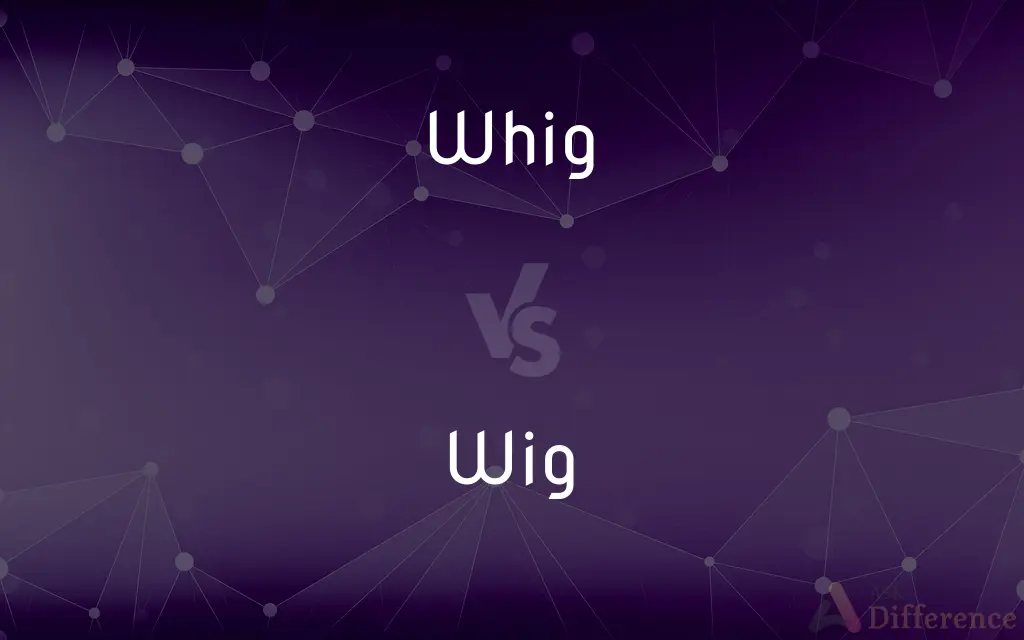Whig vs. Wig — What's the Difference?

Difference Between Whig and Wig
ADVERTISEMENT
Compare with Definitions
Whig
A member of an 18th- and 19th-century British political party that was opposed to the Tories.
Wig
A wig is a head or hair accessory made from human hair, animal hair, or synthetic fiber. The word wig is short for periwig, which makes its earliest known appearance in the English language in William Shakespeare's The Two Gentlemen of Verona.
Whig
A supporter of the war against England during the American Revolution.
Wig
An artificial covering of natural or synthetic hair worn on the head for personal adornment, as part of a costume, or to conceal baldness.
Whig
A 19th-century American political party formed to oppose the Democratic Party and favoring high tariffs and a loose interpretation of the Constitution.
ADVERTISEMENT
Wig
To scold or censure.
Whig
Acidulated whey, sometimes mixed with buttermilk and sweet herbs, used as a cooling beverage.
Wig
A head of real or synthetic hair worn on the head to disguise baldness, for cultural or religious reasons, for fashion, or by actors to help them better resemble the character they are portraying.
Whig
Buttermilk
Wig
A bigwig
Whig
(transitive) Urge forward; drive briskly.
Wig
An old seal.
Whig
(intransitive) Jog along; move or work briskly.
Wig
To put on a wig; to provide with a wig (especially of an actor etc.).
Whig
(transitive) Weird out or disturb someone.
Wig
To upbraid, reprimand.
Whig
Acidulated whey, sometimes mixed with buttermilk and sweet herbs, used as a cooling beverage.
Wig
To act in an extremely emotional way; to be overly excited, irritable, nervous, or fearful; behave erratically.
That guy must be high. Look how he's wigging.
Whig
One of a political party which grew up in England in the seventeenth century, in the reigns of Charles I. and II., when great contests existed respecting the royal prerogatives and the rights of the people. Those who supported the king in his high claims were called Tories, and the advocates of popular rights, of parliamentary power over the crown, and of toleration to Dissenters, were, after 1679, called Whigs. The terms Liberal and Radical have now generally superseded Whig in English politics. See the note under Tory.
Wig
To shoot in the head.
Whig
A friend and supporter of the American Revolution; - opposed to Tory, and Royalist.
Wig
A covering for the head, consisting of hair interwoven or united by a kind of network, either in imitation of the natural growth, or in abundant and flowing curls, worn to supply a deficiency of natural hair, or for ornament, or according to traditional usage, as a part of an official or professional dress, the latter especially in England by judges and barristers.
Whig
Of or pertaining to the Whigs.
Wig
An old seal; - so called by fishermen.
Whig
Urged social reform in 19th century England
Wig
To censure or rebuke; to hold up to reprobation; to scold.
Whig
A supporter of the American Revolution
Wig
Hairpiece covering the head and made of real or synthetic hair
Whig
A member of the Whig Party in the United States in pre-Civil-War times
Wig
British slang for a scolding
Share Your Discovery

Previous Comparison
Pathway vs. Path
Next Comparison
Dumb vs. Dummy














































